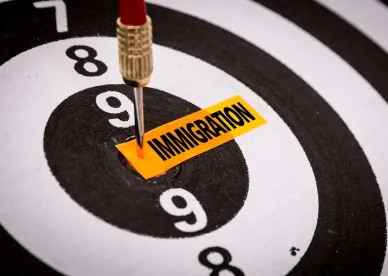USCIS may be issuing Notices to Appear (NTAs) in business immigration cases due to a new policy guidance. NTAs are the initial charging documents in a removal or deportation case.
USCIS grants and denies immigration benefits, but it will be more directly involved in enforcement now. NTAs are served on immigrants or their attorneys. They generally set out the charges and may include the date, time, and location where the immigrant must appear for what is usually a Master Calendar hearing. At that hearing, the Immigration Judge (IJ) often will take the charged party’s plea and schedule the case.
According to the new policy guidance, USCIS will issue NTAs where:
-
Fraud or misrepresentation is substantiated;
-
An applicant is convicted of, charged with, or has committed acts chargeable as criminal offenses;
-
Naturalization cases (N-400 applications) are denied on “good moral character” grounds because of a criminal offense; and
-
An application or petition is denied leaving the applicant unlawfully present in the U.S.
This last ground is the one most likely to arise in business immigration cases. It would cover, for instance, employees who have long-pending extensions of stay denied after their underlying status expires. It also would cover employees who have I-140s and their concurrent I-485s denied if their underlying nonimmigrant status has elapsed.
In the past, in these situations, the employees were advised by the USCIS that they had to leave the U.S., but deportation proceedings through the issuance of an NTA was not immediately initiated. Beyond the fact that issuing more NTAs will lead to even greater backlogs in the already crammed dockets of U.S. immigration courts, once an NTA is issued, there will be severe consequences.
The foreign national must remain in the U.S. (probably without work authorization) until the hearing, to avoid becoming subject to a 5-year bar on re-entry. During this waiting period, however, the foreign national will be accumulating unlawful presence and, depending upon the length of the wait, could become subject to a 3- or 10-year bar on re-entry based on this accrual. The foreign national might be able to obtain a waiver of the 5-year bar and, if the case is ultimately dismissed, any unlawful presence would be wiped out, but the risks are there.
USCIS Director L. Francis Cissna explained the new policy:
“For too long, USCIS officers uncovering instances of fraudulent or criminal activity have been limited in their ability to help ensure U.S. immigration laws are faithfully executed. This updated policy equips USCIS officers with clear guidance they need and deserve to support the enforcement priorities established by the president, keep our communities safe, and protect the integrity of our immigration system from those seeking to exploit it.”
Means of dealing with this latest assault on business immigration may include early extension and green card applications, appeals and litigation, as well as more consistent use of premium processing.




 />i
/>i
